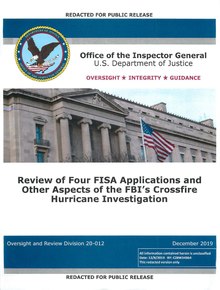Crossfire Hurricane (FBI investigation)
[3] A subsequent review done by Justice Department Inspector General Michael E. Horowitz, released in redacted form in December 2019, found no evidence that political bias against Trump tainted the initiation of the investigation,[4][5][6][7][8][9] but did find that the FBI made 17 errors or omissions in its FISA warrant applications to the Foreign Intelligence Surveillance Court (FISA Court) for surveillance of former Trump aide Carter Page.
[13] On August 19, 2020, a former FBI attorney pleaded guilty to making a false statement stemming from his alteration of an email connected to one of the FISA warrant applications.
[21] Mifsud traveled to Moscow in April 2016, and upon his return he told Papadopoulos that Russian government officials were in possession of "thousands of emails" that could be politically damaging to Hillary Clinton.
[23] On May 6, Papadopoulos met Alexander Downer, the Australian High Commissioner to Britain in a London bar, and told him about the Clinton emails over drinks.
The report corroborated that the FBI opened its counterintelligence probe in late July 2016 "following the receipt of derogatory information about foreign policy advisor George Papadopoulos".
[41][42][43] In June 2018, the Department of Justice's Office of the Inspector General released a report on its counter-investigation into the FBI's investigation of the Hillary Clinton email controversy.
[45][46] A review of Crossfire Hurricane done by Justice Department Inspector General Michael E. Horowitz resulted in a report released in December 2019.
[49] Trump's 2016 campaign had prominently featured another Rolling Stones song, "You Can't Always Get What You Want", at rallies and at the 2016 Republican National Convention.
"[52] Crossfire Hurricane initially targeted several people connected to the Trump campaign: Papadopoulos, Michael Flynn, Paul Manafort, Carter Page and Roger Stone.
[66][67] During the summer of 2016, the FBI applied for a warrant to conduct surveillance on four members of the Trump campaign, but this application was rejected by the FISA court as too broad.
[51] The Steele dossier alleged that Page had originated the idea of leaking the DNC emails,[71] and that he was negotiating a share of Rosneft in exchange for Trump lifting sanctions against Russia if elected.
[51] The request was signed by Comey and Deputy Attorney General Sally Yates, and Judge Rosemary M. Collyer issued the warrant, concluding there was probable cause to believe Page was a foreign agent knowingly engaging in clandestine intelligence for the Russian government.
[51][70] Shortly after the opening of the Crossfire Hurricane investigation on July 31, 2016, the FBI used confidential human sources (CHS) to conduct meetings with individuals affiliated with the Trump campaign.
[80] Page and Halper also met at a London symposium on July 11–12, 2016, before the meetings mentioned above, which led critics of the FBI to suspect that the probe started earlier than stated.
[88] The Times further suggests that Turk may have been assigned to serve as a witness in the event the investigation was ultimately prosecuted and the government needed the credible testimony of such an individual without exposing Halper as a longtime confidential informant.
[109] Finally, the review did not produce evidence "political bias or improper motivations influenced" the FBI's usage of confidential sources or undercover agents for interactions with members of Trump's campaign.
[111][112] The discussion touched on the Steele Dossier and the relationship between incoming National Security Adviser Michael Flynn and Russian Ambassador Sergey Kislyak.
[111] According to Rice's email, during the meeting, President Obama stressed that the continuing investigation should be handled "by the book" and that he was not "asking about, initiating, or instructing anything from a law enforcement perspective".
The email also stated that Obama directed them to be "mindful to ascertain if there is any reason that we cannot share information fully as it relates to Russia" with members of the incoming administration.
[24][60][125][127] Rosenstein's authority to appoint Mueller arose due to Attorney General Jeff Sessions's March 2017 recusal of himself from investigations into the Trump campaign.
[133] On January 27, 2017, Papadopoulos had lied to FBI investigators regarding his contacts with Joseph Mifsud, a Maltese professor with connections to Russian government officials.
[140] The Mueller Report concluded that Russian interference in the 2016 presidential election did occur "in sweeping and systematic fashion" and "violated U.S. criminal law".
[145][146][147] To establish whether a crime was committed by members of the Trump campaign with regard to Russian interference, the special counsel's investigators used conspiracy law, and not the concept of "collusion".
Additionally, Durham criticized the FBI and Justice Department for failing "to uphold their important mission of strict fidelity to the law in connection with certain events and activities described in this report."
This conclusion differs from a December 2019 probe by the Justice Department inspector general which found that sufficient evidence existed to launch the investigation.
[162] During Senate testimony after the report's release, Horowitz attributed the warrant problems to "gross incompetence and negligence" rather than intentional malfeasance or political bias,[9] and stated: "The activities we found don't vindicate anyone who touched this.
[3] The report also refuted Trump's assertions that Peter Strzok and Lisa Page had initiated the investigation; that decision was made by William Priestap, the assistant FBI director for the Counterintelligence Division.
[165] FBI Director Christopher A. Wray said he accepted the OIG's findings and had "ordered more than 40 corrective steps to address the Report's recommendations", and added it was "important that the inspector general found that, in this particular instance, the investigation was opened with appropriate predication and authorization".
[166] Attorney General William Barr rejected the OIG's key conclusion and continued to assert that the FBI's investigation into Trump was unjustified.
[160] In an op-ed published in the Washington Post, Comey wrote: "the truth is finally out, ... and those who smeared the FBI are due for an accounting" and called upon Attorney General Barr to "acknowledge the facts" and "stop acting like a Trump spokesperson.


